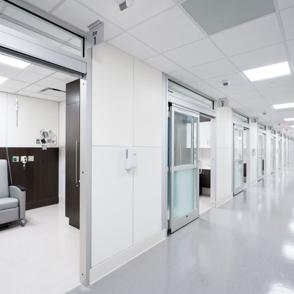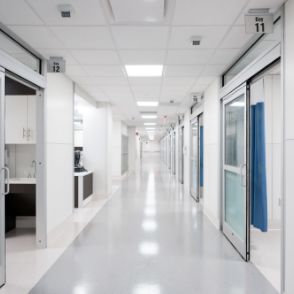Infection control in consulting rooms plays a critical role in keeping both patients and staff safe.
While technological advancements and equipment often take center stage, the design of the space, from the materials used to the room layout, does have a deep impact on infection prevention.
This blog explores how infection control in consulting rooms can be improved by making simple, effective design choices, such as selecting the right materials, layout flexibility and easy-to-clean surfaces.
The Role of Materials in Infection Control
The selection of materials is a key aspect to achieve the desired infection control in consulting rooms. Choosing the right surfaces can make the cleaning process easier and more efficient, reducing the spread of harmful pathogens.
Non-porous surfaces are essential for preventing the absorption of bacteria and viruses, making them much easier to clean and disinfect. By using high-quality materials such as antibacterial coatings, modular panels and durable finishes, healthcare environments can maintain a higher standard of hygiene.
Additionally, materials must be resilient enough to withstand frequent cleaning with strong disinfectants without deteriorating, all while maintaining their functionality and aesthetic appeal. Choosing the right materials ensures hygiene and also extends the life cycle of the room, making the space more cost-effective and sustainable in the long term.
Designing Easy-to-Clean Surfaces to Reduce Infection Risks
The layout and design of the room must facilitate this process by minimising hard-to-reach areas and reducing the presence of surfaces that are difficult to clean.
Key features such as seamless wall panels and floors, integrated hand sanitisation stations and touchless systems for doors and sinks are an essential part in reducing the spread of pathogens. These design choices eliminate unnecessary contact points, making it easier to maintain a clean and safe environment.
Modular and Flexible Design for Healthcare Spaces
The true value of modular design in healthcare environments lies in its capacity for dynamic reconfiguration. Modular wall systems offer healthcare facilities unprecedented flexibility to rapidly adapt spaces to changing clinical needs and operational requirements.
These innovative solutions enable healthcare providers to transform consultation rooms into isolation zones, clinical support spaces or alternative treatment areas without extensive renovations. During outbreak scenarios or periods of heightened infection risk, this adaptability becomes crucial. Facilities can seamlessly repurpose existing areas to meet evolving healthcare demands, ensuring optimal response to changing operational requirements.
By design, these systems support the long-term adaptability of healthcare environments and allows these spaces to evolve alongside changing medical practices, technology and patient care strategies.
Reducing Cross-Contamination with Smart Layouts:
Cross-contamination is an ongoing concern, particularly in consulting rooms where patient and staff interaction are more frequent.
A well-designed room should have clearly defined zones for high-risk activities, such as patient examination and low-risk areas where contact with infectious materials is less likely.
By incorporating these considerations into the design of consulting rooms, healthcare providers can better control the movement of pathogens and maintain a safer environment for both patients and staff.
Prioritising Infection Control in Every Design
Infection control in consulting rooms is about designing spaces and choosing materials and systems with infection prevention in mind, but also ensuring we support healthcare professionals in providing the highest quality care.
We understand the importance of this and through our intentional design approach, we offer healthcare spaces that not only bring a sleek design but also function as a key line of defence in infection control. After all, keeping patients safe and maintaining a clean, efficient environment should always be a top priority.






Sorry, the comment form is closed at this time.